|
|
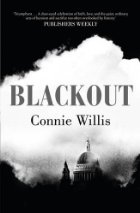 In 2060, humans have discovered time travel, and it’s now a fantastic method for historians to get a real view of what happened in the past. For three young historians, England during World War II is the destination of choice. Eileen, or Merope in 2060, is assigned to be a maid in a country house, looking after evacuees. Mike Davis finds himself posted to just before Dunkirk to watch the boats depart. Polly Sebastian, meanwhile, heads straight into the heart of the London Blitz. Each goes armed with knowledge to survive his or her particular assignment and full knowledge of where their “drop” points are and when they’re meant to check in. But, around the same time for each of them, things start to go wrong, and these historians find that rather than simply observing history, they have to live it. In 2060, humans have discovered time travel, and it’s now a fantastic method for historians to get a real view of what happened in the past. For three young historians, England during World War II is the destination of choice. Eileen, or Merope in 2060, is assigned to be a maid in a country house, looking after evacuees. Mike Davis finds himself posted to just before Dunkirk to watch the boats depart. Polly Sebastian, meanwhile, heads straight into the heart of the London Blitz. Each goes armed with knowledge to survive his or her particular assignment and full knowledge of where their “drop” points are and when they’re meant to check in. But, around the same time for each of them, things start to go wrong, and these historians find that rather than simply observing history, they have to live it.
I put Blackout on my pile for Long-Awaited Reads Month and am I glad – this is a book I shouldn’t have put off for a year. There were many aspects about it that I really, really liked, and by the time I reached the end, I was thrilled that I had All Clear on the shelf waiting for me to pick this story back up again. The book doesn’t really end, it just cuts off, and there are many loose plotlines left dangling for the second book to pick up again. I’ve since had a poke around the internet and I’m fortunate to have picked it up after All Clear was published; one big complaint for early readers is that they were left hanging for an entire year. I’m happy that won’t happen to me.
While my edition of this book is over 600 pages long, I found that it fled by as I got wrapped up in the individual problems of Eileen, Mike, and Polly. My previous experience with Willis’s time travel books is Doomsday Book which I also loved, so I was prepared to get deep inside each character’s mind as everything starts to go wrong. I actually found the whole process that each of them went through really fascinating – they’re all so confident in their ability to escape at will that they don’t really think much about where they’re going. Polly, for instance, gets an implant with each and every bombing incident during the part of the Blitz that she is meant to experience, so she’s not meant to be in any real danger. Instead, she’s assigned to just watch how those who are actually in danger experience it, and that’s all she expects. Of course, when the drop doesn’t open and she realizes that she’s actually stuck in the middle of the London Blitz, and sometimes has no real way of actually knowing where and when is safe, her perspective completely changes.
At that point, when the three of them start to wonder about what’s happened to their retrieval teams and their drop points, they each start to actually live in the midst of World War II. There is some element of repetitiveness, as a lot of what they experience is quite similar; there are meant to be retrieval teams that investigate if they haven’t returned at a certain point, and they each spend a lot of time pondering their arrival. In addition, they start to worry that they’ve affected history, despite the apparent truth that historians can’t alter history, particularly Mike, who finds himself seemingly changes events at a critical period in World War II. Not only do they panic about what happens next to themselves, they start to feel as though they genuinely *don’t* know what’s going on in the war.
I particularly loved how Willis depicted ordinary heroism in the face of extraordinary danger. At times, particularly during the bombing raids, her descriptions reminded me how devastating a war this was for London and that it didn’t happen all that long ago. Even for people who weren’t that close to the bombs, living with the reality and unpredictability that each night might be their last took an incredible amount of courage. The atmosphere that she evokes is incredibly well done. One of my very favorite parts of the book had a Shakespearean actor getting up in the middle of an air raid shelter and going through monologues to distract the others in the shelter. That scene is going to stay with me for some time.
Blackout is a book that I had an amazing time with, but don’t read it unless you have All Clear ready to go immediately after – otherwise, you’ll be frustrated that it ends in the middle with no resolution whatsoever. So far it looks like I’ll be recommending these!
All external book links are affiliate links. I purchased this book and its sequel.
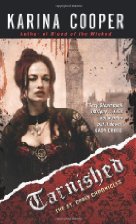 Cherry St. Croix lives in two worlds, London Above and London Below. Above, she’s the somewhat ostracized daughter of a mad scientist and his aristocratic, much-loved wife; after their deaths when she was a child, Cherry has had to navigate the waters of London’s social set with the guidance of her guardian, but she has never had much success or care for the intricate social politics. Below, she’s a Collector, a detective of sorts who finds and turns in people who owe something to others. As the only female collector, and one who has to keep her identity a secret, Cherry takes great pride in her success. But then, one of her bounties disappears, and the “sweets”, or prostitutes, of Below’s menagerie tell her about a horrible murder and ask for her help in finding the killer. Cherry St. Croix lives in two worlds, London Above and London Below. Above, she’s the somewhat ostracized daughter of a mad scientist and his aristocratic, much-loved wife; after their deaths when she was a child, Cherry has had to navigate the waters of London’s social set with the guidance of her guardian, but she has never had much success or care for the intricate social politics. Below, she’s a Collector, a detective of sorts who finds and turns in people who owe something to others. As the only female collector, and one who has to keep her identity a secret, Cherry takes great pride in her success. But then, one of her bounties disappears, and the “sweets”, or prostitutes, of Below’s menagerie tell her about a horrible murder and ask for her help in finding the killer.
I really liked this book; it’s a twist on steampunk London, adding fantasy and new elements that made for an interesting world. I thought the actual, literal split between London’s rich and poor was a fascinating division, and it means that whoever shows up “Below” has a real motive and a reason for being there. It appears to be a racial divide as well, although I don’t recall any explicit mention of this. All of the characters of color are met under London, and the social elites are all white. The literal divide means that Cherry actually does live in two worlds, and her different identities in each are starkly defined.
The story itself is actually wrapped up in Cherry’s identity, though; the mystery that she attempts to solve is closely wrapped up in her own past, and as a result we do get a significant amount of her backstory in this one book. We need to, just to understand what’s going on and why it matters. I thought the story was decently intriguing, although readers should be aware that it doesn’t end here at all, and plenty of mysteries are left unsolved for future books in the series.
There is also a romance element to this particular book, although it doesn’t actually get very far. Cherry doesn’t really fall in love with anyone, but she has an intense attraction to two men who personify the split between her two worlds. The first is the leader of the Menagerie, a dark and charismatic figure that Cherry can’t avoid being attracted to; the second is the son of her worst aristocratic nemesis, a tall and golden-haired earl. It’s immediately clear that to be with either, Cherry would have to sacrifice one of her identities, but there’s no hint of a choice in this book, just the beginning of what could be a love triangle in the future.
While Tarnished was a good read, it remained a like, not love, book, for reasons I can’t really explain. Certainly good enough to continue with the series, though; I’d recommend it to those who like urban fantasy and steampunk, but it wouldn’t be the first on my list for current urban fantasy series just yet.
All external book links are affiliate links. I purchased this book.
 Translating, often assumed to be a fairly standard process, is in reality anything but. Text is one language is not directly transferable to another language. Just try translating an idiom from one language to another; finding a needle in a haystack or having your mouth water is not something that can be directly translated. And what is translation, anyway? To what extent do you change the text to make it fit in, and to what extent do you change it further to give a text an “atmosphere”? In this book, David Bellos, a translator himself, deconstructs the process and examines why we do what we do when we convert something from one language into another. Translating, often assumed to be a fairly standard process, is in reality anything but. Text is one language is not directly transferable to another language. Just try translating an idiom from one language to another; finding a needle in a haystack or having your mouth water is not something that can be directly translated. And what is translation, anyway? To what extent do you change the text to make it fit in, and to what extent do you change it further to give a text an “atmosphere”? In this book, David Bellos, a translator himself, deconstructs the process and examines why we do what we do when we convert something from one language into another.
My interest in this particular topic has been prompted by the fact that the company I work for in real life specializes in multilingual and multinational search. We have a translation agency in our company, and I’ve personally been involved in many projects where translation is involved and is really important to the project in question. Plus, with such an international workforce, it’s fun to get into debates about how different languages are and how it’s much more difficult to translate between some than others. We always focus on local and local knowledge as much as we possibly can, but there has to be the ability to translate somewhere, and that’s why I was quite curious about the actual process – plus, an ongoing interest in linguistics that I’ve abandoned since university is always a factor.
That said, I’d expected something a lot lighter than this book actually was. Bellos is an academic and his book reads like one that was written by an academic. Some parts are fascinating and full of facts, while others are a bit dry. He has one particular chapter that’s about meaning and how it’s expressed, which isn’t a light read for anyone. It’s all fascinating, in my view at least, but it took me longer and more brain power to get through than your average non-fiction read.
I did feel as I was reading that I was really learning something, though; I don’t speak anything but English fluently, so a lot of the book was new to me since I don’t know what goes through a translator’s head. I loved particular little tidbits which really made me feel I was genuinely learning, such as:
For the ancient Greeks, the sound of the foreign was the unarticulated, open-mouthed blabber of va-va-va-, which is why they called all non-Greek-speakers varvaros, that is to say, barbarians, “blah-blah-ers”.
I already knew about what he says directly after – that the Russian word for German means, basically, deaf – but that about the origin of the word “barbarian” just made me smile.
Bellos wraps up the book with more thoughts on meaning, and how we can express meaning without language at all. It’s a thoughtful look back at the whole book and the way people actually understand each other. I really liked Is That a Fish in Your Ear?, but I don’t think it’s for everyone; if you do enjoy languages and translation, though, it’s certainly a book that you should try.
I purchased this book.
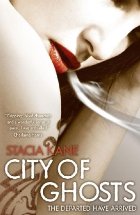 Chess Putnam is a wreck in almost any way she can think of. She’s driven away her closest friend by sleeping with another man and she’s a drug addict that can barely function without a few pills. The only positive thing in her life, really, is her job as a Church witch and her faith in the Church’s ability to debunk ghosts. Even that faith is about to be thrown into question, though, as Chess begins working with a girl called Lauren, the daughter of the Grand Elder, a Church cop. Chess feels that there is something wrong about Lauren; her spells are wrong, her magic is wrong, but with the promise of a hefty check in the bank and little reason to pursue other paths in life, she goes along with it, only to find that the Church is not nearly so powerful as she’d thought. Chess Putnam is a wreck in almost any way she can think of. She’s driven away her closest friend by sleeping with another man and she’s a drug addict that can barely function without a few pills. The only positive thing in her life, really, is her job as a Church witch and her faith in the Church’s ability to debunk ghosts. Even that faith is about to be thrown into question, though, as Chess begins working with a girl called Lauren, the daughter of the Grand Elder, a Church cop. Chess feels that there is something wrong about Lauren; her spells are wrong, her magic is wrong, but with the promise of a hefty check in the bank and little reason to pursue other paths in life, she goes along with it, only to find that the Church is not nearly so powerful as she’d thought.
I’ve more or less stopped reviewing most of the urban fantasy that I read on my blog because I tend to read books in a series very often and very quickly, and once I get to the middle of a series, it gets harder to keep track of spoilers and find something unique to say about each installment. But everyone, I loved this book in a way that makes me want to write about it, so here I go giving it a try once again. I don’t love it in the way that I love, say, The Remains of the Day or Among Others, but this was such an incredible, addictive, heart-pounding read that it satisfied every little desire I had for an urban fantasy book.
I really like the darkness that this series brings along with it. Chess’s city, especially Downside, is not a nice place to live. It reminds me of a Gotham city, except even more corrupt; the people she cares about are all generally drug pushers or addicts, except for those in the church, and her own life is an example of how a person gets so addicted to drugs that they can rarely care about anything else. But Chess does care about something else, and that something else is actually a person called Terrible. You see, in the last two books, we’ve been watching the relationship between Chess and Terrible develop, in a heart-melting, exciting way, until he saw something that turned him away from her completely.
The agony that’s resulted from this for Chess is incredibly intense – it took losing him to realize how much she really cared about him, and watching their relationship move on from this was honestly so emotional that I couldn’t believe I was feeling quite that much about these two people who are so incredibly broken. Terrible is a guy that scares the people of Downside as Bump’s chief enforcer; he is the guy who forces money out of people if they don’t pay up for their drugs. He’s so far from the charming rogues that grace some of my favorite historical romance novels that I doubt he’d recognize a suit if he saw one. But based on these books, I completely fell in love with his character, and with Chess and him together. Yes, she screwed up, but this relationship is simply addiction of the strongest kind. For them, and for me, the reader.
The story itself is good too, of course; the mystery around what’s happening with Lauren and Chess’s investigation is well worth following. But as always for me with a series, it’s the relationships that characters build that keep me going, and this series has completely, already, hooked me in. Very, very highly recommended.
I purchased this book.
 Miles Vorkosigan, one of the Barrayaran Emperor’s right-hand men, has been sent to investigate rumors of bribery and corruption on a world which focuses heavily on the cryogenics industry before those industries get involved on Barrayar. On Kibou-daini, almost everyone gets frozen either before or very immediately after their deaths, which has led to a huge bureaucracy built up around the industries that supply this freezing technology. Miles, a man whose life was saved by cryo technology, isn’t going to fault them for wanting to avoid death, but what he does find is a cold, corrupt industry that fails to look after those who have entrusted their lives to the future. Miles Vorkosigan, one of the Barrayaran Emperor’s right-hand men, has been sent to investigate rumors of bribery and corruption on a world which focuses heavily on the cryogenics industry before those industries get involved on Barrayar. On Kibou-daini, almost everyone gets frozen either before or very immediately after their deaths, which has led to a huge bureaucracy built up around the industries that supply this freezing technology. Miles, a man whose life was saved by cryo technology, isn’t going to fault them for wanting to avoid death, but what he does find is a cold, corrupt industry that fails to look after those who have entrusted their lives to the future.
Like many others have said before me, Cryoburn isn’t really a novel that stands up the same as the other Vorkosigan novels do. While Miles is still the main character, he is no longer growing and changing; he’s the same disarmingly clever and ingenuous man as always, but he’s now completely matured and committed to the world as he knows it. Not many of the series’s other recurring characters appear in this book; Ekaterin features in just one scene and we don’t even get to visit Miles’s children. The only one with Miles is Armsman Roic, although a few familiar faces appear in the latter half of the book. The stakes aren’t quite as high here either; sure, things are messed up on Kibou-daini and for many of the people Miles meets, but he himself is out of danger and off investigating fairly quickly.
For what it was, though, I quite enjoyed it. I liked meeting the side characters and seeing Miles through a different set of eyes yet again, especially those of the children. Jin with his menagerie was a charming character, although I didn’t really understand why he was so adamant about running away from his aunt, especially if she let him keep his animals outside. Even the other Barrayarans on the planet with Miles were entertaining, and I liked what Bujold did with those stories too. It was a book that I enjoyed reading, but it wasn’t a book that would have made me fall in love with the series as I have over the past year and a half.
That said, then the ending happened, and I had to pick my jaw up off the floor. I know the next book in the series features Ivan, not Miles, but seriously, after that? I had to take a break from reading to recover for a while. It totally wouldn’t have worked if I hadn’t had the accumulated feelings from the entire series, I think; each of the little snippets was heart-breaking in its own way. Another reminder that this is a series which belongs all together, and it’s not worth reading from it without starting at the beginning.
As with all the Vorkosigan books, this series is highly recommended. Start with Cordelia’s Honor or Young Miles!
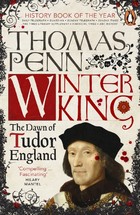 Henry VII, despite being the founding member of the Tudor dynasty, is not actually that well known as a historic figure. His son, granddaughters, and immediate predecessor are all much more prevalent in both fiction and non-fiction, but Henry himself was a significant figure that shouldn’t really be ignored. A bridge between the Plantagenets and the Tudors, Henry changed kingship in England in ways that directly influenced his son, Henry VIII, and shifted the country’s attitude permanently. Henry VII, despite being the founding member of the Tudor dynasty, is not actually that well known as a historic figure. His son, granddaughters, and immediate predecessor are all much more prevalent in both fiction and non-fiction, but Henry himself was a significant figure that shouldn’t really be ignored. A bridge between the Plantagenets and the Tudors, Henry changed kingship in England in ways that directly influenced his son, Henry VIII, and shifted the country’s attitude permanently.
This book has won accolades from numerous publications; my copy has an extensive list of awards sprawled right across the top of the cover, as you can see in the image to the left. It’s hard not to have high expectations for such a book, and indeed I was hoping for quite a lot from it, a more definitive view of a king who often remains in the shadows. Rather than not meeting my expectations, I’d probably say that I got a slightly different experience than I was thinking I would, but one that was still worthwhile regardless.
For one thing, this book doesn’t cover Henry’s entire life, not really. It focuses very heavily on his actual kingship, much less on the road there. Over quite a lot of the book, we can see exactly why Henry himself has remained a shadowed figure. Towards the end, he was a reclusive figure, often ill, and the deaths of his wife and first-born son seem to have pushed him ever further away from history’s prying eyes. He preferred to let his agents and ministers do the visible work, while they were responsible directly to him. Among these tasks was that of building his coffers by accusing people of crimes and extorting money from them, even if they hadn’t actually committed a crime at all. Worse, these agents rewarded informers, and lessened fines for those who did tell on their neighbors, creating a classic situation whereby everyone is falsely accused of something and no one profits but the government. Penn’s version of Henry VII’s reign sounds a torment to his subjects, punctuated by occasional generosity whenever the king suffered a bout of conscience.
The biography is written in a literary but relaxed style, one that would be very suitable for historical fiction. It makes the book easy to read, adding a small amount of imagination at times, but it wasn’t what I’d expected. It can be confusing sometimes, however, because when the author introduces someone new, we expect him to come back again and again, but in reality that particular person might have had only a small or insignificant effect on the reign overall. Because Henry’s government was large, and his ministers rotated often, there are a number of names in here, and I found it surprisingly difficult to keep them straight.
What I did like, though, was how readily Penn demonstrated what a change Henry VIII was. In some ways, the book focuses a lot more on this second son, who gained in power and prestige as Henry VII began to fade away. We can easily see, assuming Penn’s depiction of the taxes is correct, how the people might have been overjoyed to have a young, strong, chivalrous monarch rather than a reclusive aging one; a new monarch who might change policies and make their lives easier.
I also really appreciated how Penn emphasized that Henry VII’s reign was difficult. It was not guaranteed, as we always assume it is with the benefit of hindsight. No – he knew all too well how easily a crown could be taken away, and he must have known that he actually had no real right to it, given that he was descended from bastardy on both sides and couldn’t actually inherit through either. He was threatened over and over again by those he labelled pretenders, and building his dynasty through his children, who could inherit legitimately through his wife Elizabeth of York, was absolutely essential. With this in mind, it’s also easy to consider Henry VIII’s better-known obsession with having a son; might this be a lesson he learned from his father after his older brother Prince Arthur died unexpectedly?
Though by no means a perfect book, and far from a stereotypical biography, Penn’s work on the reign of Henry VII provides much food for thought on an English monarch who is often pushed to the sidelines. Recommended.
I have an unfortunate number of books that I read too long ago to write a normal, coherent, 500+ word review. So, more mini reviews are in order, to wipe the slate clean and feel like I can actually catch up with this blog of mine one of these days. These are all fantasy, although Blackout is on the line between fantasy and science fiction.
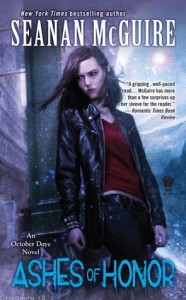 Ashes of Honor, Seanan McGuire Ashes of Honor, Seanan McGuire
I love these books so much that I’ve lost the ability to even review them objectively, let alone in a way that will get you to read them with me. The stakes for Toby are always high, but in this one, they keep going up, and many characters from earlier books in the series pop back in again to help. And, I have one word for those who have read books in this series before: Tybalt. I am so invested in this series and these characters; I just sat down and read this book straight through because I simply had to know what happens next.
So, if you haven’t read these and you have the slightest interest in urban fantasy, get started with Rosemary and Rue!
 The Hidden Goddess, M.K. Hobson The Hidden Goddess, M.K. Hobson
I was one of the fans of Hobson’s The Native Star, so when the next book in the trilogy came out, I was looking forward to continuing this romantic historical fantasy series. While I liked it, I didn’t really fall in love with it. I think it’s suffering a bit from middle-book syndrome, and it’s definitely suffering from a lack of romantic interest. After the heady romance in the first book, I stopped being really sold on Emily and Stanton here. I’ll definitely pick up the third book in the trilogy, but it will probably sit on the shelf as long as this one did.
 Blackout, Mira Grant Blackout, Mira Grant
I feel guilty for consigning two of this author’s books to the mini reviews pile, but that’s what I get for putting off writing reviews – better something than nothing. Blackout was excellent; I had the pleasure of reading it with Jodie, mostly because we were terrified at what the author might do to the characters after the first book, but I was mostly satisfied by how it went and, while I was reading, I was completely glued to the pages. An excellent trilogy, totally worth your time, but make sure you start with Feed.
 Daughter of Smoke and Bone, Laini Taylor Daughter of Smoke and Bone, Laini Taylor
And finally we get to the book that everyone raves about but which I didn’t like much. I still don’t entirely see the appeal. I just didn’t fall in love with this book. I do often have difficulty with YA romance-y books, which I appreciate makes no sense as I inhale regular romance novels easily enough. But this one, I just didn’t connect with. I didn’t buy the magical connection between Akiva and Karou and – in all honesty – I saw the twist coming. And that never happens for me, as I’m horrendously bad at predicting what’s going to happen (on purpose). It’s more than that, though; I just felt like the book was too contrived, and I didn’t believe in what was happening.
What the book did have going for it, though, was the setting. The descriptions in this book were everything I’d imagined Prague to be, and everything I was disappointed by when it wasn’t. So that might have predisposed me against it. Just a thought.
Have you read any of these books? What did you think?
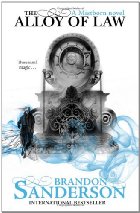 The Alloy of Law, Brandon Sanderson The Alloy of Law, Brandon Sanderson
A few hundred years after the original Mistborn trilogy, the world has moved on and progressed. The city of Elendel is a metropolis, and trains criss-cross the landscape. Criminals and lawmen alike carry guns, although the practices of Allomancy and Feruchemy in the Mistborn make life as interesting as ever. Our hero, Waxillium, is a noblemen who has taken to reviving the law in the rougher areas around the city. When personal tragedy ruins his happiness there, he returns to save his family’s estates, only to discover that the city may actually be more dangerous than the roughs ever were.
I’ve been a fan of Brandon Sanderson for a good few years now, since before I discovered he would be finishing The Wheel of Time (a discovery that delighted me at the time, but I’ve since failed to read a single book he’s written for this series). For the most part, I really enjoyed the original Mistborn trilogy, and I’ve been looking forward to The Alloy of Law for some time. While it ties into the original series, I think it stands quite well on its own and provides some excellent action, likeable characters, and an extension to Sanderson’s already very clever magic system. It’s just an all-around great read that was the perfect way to spend an evening.
Definitely recommended if you enjoy fantasy, as are all of Sanderson’s books; this isn’t an earth-shattering read, but it is a good one.
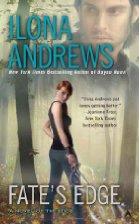 Fate’s Edge, Ilona Andrews Fate’s Edge, Ilona Andrews
Audrey Callahan wants nothing to do with the family that loves her drug addict brother, who ignores rehab and has attempted to sell her for drugs, more than her. In order to finally achieve the separation she craves, she must pull off one last heist using her unique magic ability to pick even the toughest locks. Unfortunately, that last heist kicks off a huge series of disasters, leaving Audrey on the run to get the stolen objects back with alarmingly attractive and skilled Kaldar Mar, a man who is unquestionably bad for her but somehow she can’t resist.
I’ve never quite liked Ilona Andrews’s Edge series as much as the Kate Daniels series. I don’t think it’s because the books are any worse, but it’s mainly because I don’t like the shift in protagonists each time. They feel more like paranormal romance with plot, instead of plot with ongoing occasional romance but mostly other epic awesomeness. This book, though, was probably my favorite of the three in the series so far. The spark between Audrey and Kaldar was fantastic, and the plot held together alongside that, as the reasons driving them to be together made some sense. Moreover, I remember lots of the characters from the previous books, so I felt a greater sense of continuity than I had previously.
I’d probably still recommend the Kate Daniels series first, but the Edge series of books are worth reading if you enjoy those. I can definitely say I’ll be picking up the fourth in the series when it’s released.
All external book links are affiliate links. I purchased these books.
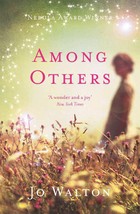 In recent years, since I’ve been keeping track, there have been two books that have catapulted themselves into becoming my instant favorite of the year. The first was The Remains of the Day by Kazuo Ishiguro. The second was The Guernsey Literary and Potato Peel Pie Society by Mary Ann Barrows and Annie Shaffer. The first has remained among my favorites ever, a book that I have forced on a number of people; for some reason my enthusiasm for the second hasn’t quite stuck nearly so much although I did love that book. Among Others by Jo Walton is now the third, a book that spoke to me in so many different ways that I couldn’t help but love it nearly from the first word. In recent years, since I’ve been keeping track, there have been two books that have catapulted themselves into becoming my instant favorite of the year. The first was The Remains of the Day by Kazuo Ishiguro. The second was The Guernsey Literary and Potato Peel Pie Society by Mary Ann Barrows and Annie Shaffer. The first has remained among my favorites ever, a book that I have forced on a number of people; for some reason my enthusiasm for the second hasn’t quite stuck nearly so much although I did love that book. Among Others by Jo Walton is now the third, a book that spoke to me in so many different ways that I couldn’t help but love it nearly from the first word.
Fourteen-year-old Morwenna’s life has been irrevocably changed by magic; from an early age she understood the consequences of wishing for something to be, and now her mother’s magic has cost her her twin sister and the full use of her leg. Mori, as she prefers to be known, runs away from her mother and ends up with her father, who had also run away from her mother, after a stint in a home for children. Sent to boarding school and away from everything and everyone she loves, except for her beloved science fiction, Mori struggles to find a life for herself and escape permanently from her mother’s influence.
There are so many ways in which I connected to this book. For one, very obvious thing, I lost my not-quite-two-years-younger brother when I was a teenager, and while it’s not the same as losing your twin I’m sure, losing a sibling that you’ve been so close to and grown up with changes your life in significant and very similar ways. As Mori notes, “The thing with dying, well, with death really, is that there’s a difference between being someone who knows they can really die at any time and someone who doesn’t.” This is something you learn when you lose your sibling at a young age, the person who you expected to be with you throughout your whole life as they had always been in memory, and the difference between life before and life after simply isn’t the same. Mori is younger than I was, but I felt like I understood her, immediately.
But it’s not just that. It’s the way that Mori grows as the story progresses over the year, the way that she discovers who she is in the absence of her surroundings, what she loves and who she can become, if only she can make that happen. Her journey is nothing less than inspiring, and though it might seem quiet on the outside, if you actually read a summarized plot, it has that ability that books I love best do to show you what happens when it looks, on the outside, like very little is happening at all.
That’s not to mention the fact that Mori loves books and spends her time surrounded by them. She reads mainly science fiction, but she has special places in her heart for fantasy and for historical fiction, and loves to learn the context about the stories she’s reading. I think this book would be even richer for someone who was more familiar with popular science fiction from the 70s, as Mori doesn’t hide her opinions and talks directly about the books she’s reading. For those I did recognize, her quotes and references are intelligent and certainly add an extra layer to the book. It would be nearly impossible, in my mind, for someone who also loves books to not relate to her, and not appreciate the way they save her from difficult situations over and over again.
Anyway, I hope I am getting across my sheer love of this book to you. After I finished, I simply sat for a while and thought of it, and actually couldn’t bring myself to start another book. I didn’t want to let Mori and her world go, not yet. Certainly not before I’d written this review, one of those rare times I’ve finished a book and immediately felt the urge to tell you all about it and persuade you to read it yourself.
So, clearly if you’ve been reading this, Among Others has my whole-hearted, enthusiastic recommendation. Please read this book, and then come back and talk to me about it. It’s won multiple awards, so it isn’t just me that fell in love with it, plenty of others have too.
All external book links are affiliate links. I purchased this book (one of the best pounds I have ever spent).
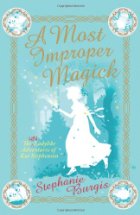 Twelve-year-old Kat Stephenson is looking for adventure. Fortunately (or unfortunately, as the case may be) she doesn’t have to look far, as she’s just discovered that she and her two older sisters may have inherited their mother’s talent for magic. While Kat is clearly a guardian, as she discovers very early on in the book, her sister Angeline has inherited her mother’s witch magic. Combined, the sisters represent a threat and a lure to many magic users in their version of Regency England. When Kat’s eldest sister Elissa is determined to sacrifice herself to ensure her family’s happiness, Kat decides that drastic action is required. Twelve-year-old Kat Stephenson is looking for adventure. Fortunately (or unfortunately, as the case may be) she doesn’t have to look far, as she’s just discovered that she and her two older sisters may have inherited their mother’s talent for magic. While Kat is clearly a guardian, as she discovers very early on in the book, her sister Angeline has inherited her mother’s witch magic. Combined, the sisters represent a threat and a lure to many magic users in their version of Regency England. When Kat’s eldest sister Elissa is determined to sacrifice herself to ensure her family’s happiness, Kat decides that drastic action is required.
I don’t have all that much to say about this book – I remember reading quite a bit about Kat, Incorrigible when it came out in the US, so when the UK version I’m reviewing here appeared on Kindle for a small amount of money, I decided to read it for myself. I got exactly what I expected – a light, fun Regency story about a young girl with magic. I liked Kat’s relationships with her sisters and her antics were fantastic to read about.
I also liked that it wasn’t just Kat who made for an interesting character. I think her second oldest sister, Angeline, also had a story of her own, as did Elissa, and their stories would have fallen a bit more into my interest range, as they both had a fair bit of romance involved. With the focus on Kat, the book is more appropriate for younger readers, and does mean that the author can have fun with her main character while still hinting at some of the internal feelings of her older, more mature sisters.
A Most Improper Magick was a fun read that I’d recommend to younger fantasy readers who would appreciate a bit of history in with their magic. I’d have loved it when I was 12, and I think many pre-teens and teenagers would feel exactly the same.
|
|
 In 2060, humans have discovered time travel, and it’s now a fantastic method for historians to get a real view of what happened in the past. For three young historians, England during World War II is the destination of choice. Eileen, or Merope in 2060, is assigned to be a maid in a country house, looking after evacuees. Mike Davis finds himself posted to just before Dunkirk to watch the boats depart. Polly Sebastian, meanwhile, heads straight into the heart of the London Blitz. Each goes armed with knowledge to survive his or her particular assignment and full knowledge of where their “drop” points are and when they’re meant to check in. But, around the same time for each of them, things start to go wrong, and these historians find that rather than simply observing history, they have to live it.
In 2060, humans have discovered time travel, and it’s now a fantastic method for historians to get a real view of what happened in the past. For three young historians, England during World War II is the destination of choice. Eileen, or Merope in 2060, is assigned to be a maid in a country house, looking after evacuees. Mike Davis finds himself posted to just before Dunkirk to watch the boats depart. Polly Sebastian, meanwhile, heads straight into the heart of the London Blitz. Each goes armed with knowledge to survive his or her particular assignment and full knowledge of where their “drop” points are and when they’re meant to check in. But, around the same time for each of them, things start to go wrong, and these historians find that rather than simply observing history, they have to live it.





















Recent Comments